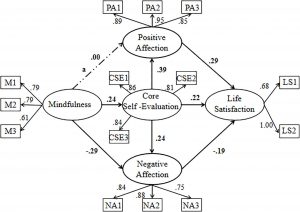Improve Satisfaction with Life with Mindfulness
By John M. de Castro, Ph.D.
“The present moment is filled with joy and happiness. If you are attentive, you will see it.” – Thích Nhat Hanh.
The primary focus of the majority of research on mindfulness has been on its ability to treat mental illness and negative emotional states such as anxiety, depression, and perceived stress. As such, it has been found to be effective for a large array of medical and psychiatric conditions, either stand-alone or in combination with more traditional therapies. But mindfulness training has also been shown to improve health and well-being in healthy individuals. So, it makes sense to study the contribution of mindfulness to satisfaction wit life.
In today’s Research News article “How Mindfulness Affects Life Satisfaction: Based on the Mindfulness-to-Meaning Theory.” (See summary below or view the full text of the study at: https://www.frontiersin.org/articles/10.3389/fpsyg.2022.887940/full?utm_source=F-AAE&utm_medium=EMLF&utm_campaign=MRK_1896364_a0P58000000G0YfEAK_Psycho_20220705_arts_A&id_mc=312338674&utm_source=sfmc&utm_medium=email&utm_campaign=Article+Alerts+V4.1-Frontiers&utm_term=%%%3d++++++REDIRECTTO(+++++CONCAT(%27http%3a%2f%2fjournal.frontiersin.org%2farticle%2f%27%2c+TreatAsContent(field(%40article%2c+%27DOI__c%27))%2c+%27%2ffull%3futm_source%3dF-AAE%26utm_medium%3dEMLF%26utm_campaign%3dMRK_%27%2c+TreatAsContent(JobID)%2c+%27_%27%2c+TreatAsContent(%40FieldId)%2c+%27_%27%2c+TreatAsContent(Substring(Replace(Field(%40field%2c+%27Name%27)%2c+%27+%27%2c ) Li and colleagues recruited college students and had the complete measures of mindfulness, satisfaction with life, positive and negative emotions, and self-evaluation.
They found that the higher the levels of mindfulness the higher the levels of satisfaction with life, positive emotions, and self-evaluation and the lower the levels of negative emotions. They also found that life satisfaction was positively related to positive emotions, and self-evaluation and the negatively associated with negative emotions. Structural modelling revealed that mindfulness was related to satisfaction with life by being related to higher core self-evaluations and lower negative emotions that were in turn related to higher satisfaction with life.
These findings are correlational and as such causation cannot be determined. But it is clear that college student satisfaction with life is positively related to their degree of mindfulness in part through mindfulness’ associations with their valuations of their selves and abilities and their emotions.
“We are shaped by our thoughts; we become what we think. When the mind is pure, joy follows like a shadow that never leaves.” – The Buddha
CMCS – Center for Mindfulness and Contemplative Studies
This and other Contemplative Studies posts are also available on Twitter @MindfulResearch
Study Summary
Li X, Ma L and Li Q (2022) How Mindfulness Affects Life Satisfaction: Based on the Mindfulness-to-Meaning Theory. Front. Psychol. 13:887940. doi: 10.3389/fpsyg.2022.887940
Life satisfaction is the general evaluation of the individual’s life, which is of great significance to achieving a better life. The purpose of the present study was to investigate the mediating effect of core self-evaluation, positive affect, and negative affect in the relationship between trait mindfulness and life satisfaction based on the Mindfulness-to-Meaning theory. 991 Chinese undergraduates (692 females, 299 males) completed the Mindful Attention Awareness Scale, the Core Self-Evaluations Scale, the Positive Affect and Negative Affect Scale, and the Satisfaction with Life Scale. The results indicated that core self-evaluation and negative affect mediated the effect of trait mindfulness on life satisfaction, consistent with the Mindfulness-to-Meaning theory. Furthermore, trait mindfulness affected life satisfaction by the mediation paths of “core self-evaluation→positive affect” and “core self-evaluation→negative affect,” which uncovered the underlying mechanism of promoting life satisfaction by combining the point of view of cognition (core self-evaluation) and emotion (positive and negative affect). The present study not only contributes to a better theoretical understanding of how trait mindfulness links to life satisfaction but also provides valuable guidance for enhancing life satisfaction.
